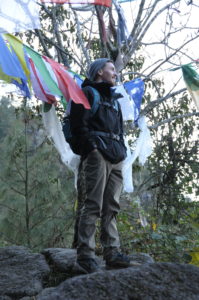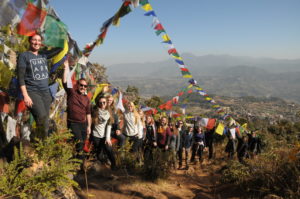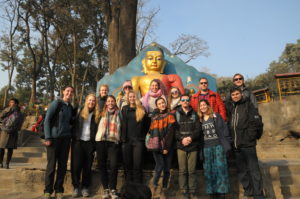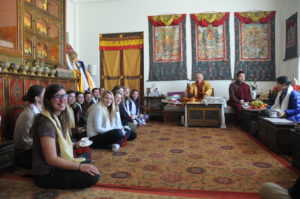Maybe it was exhaustion, or culture shock, or both. Whatever it was, UMW junior Jarrett Ashby still tears up when he thinks about it. He’d traveled halfway around the world to Nepal, spent the day visiting a temple and there he was, tired and weary, on a road lined with the jagged rocks of the Himalaya mountains, the moon trading places with the sun. Then he looked down.

“It was the most beautiful experience …” he said of the twinkling lights of the village below, “knowing that I’m just this little piece in the world, and the world is so big and bright.”
Ashby was one of several UMW students to gain a new mindset on a Winter Break trip, the capstone experience of a debut UMW course called “International Perspectives on Civic Engagement: Nepal.” Infused with service opportunities, the excursion gave the group a chance to live what they’d studied in the classroom. For participants, the venture represents “the height of their liberal arts education,” said Assistant Professor of Religion Dan Hirshberg, who teamed up with Associate Professor of Psychological Sciences David Rettinger to teach the class.
Pairing their expertise – Hirshberg’s knowledge of Nepal (he’s traveled to the South Asian country six times) and Rettinger’s penchant for service learning (he’s executive director of UMW’s Center for Honor, Leadership and Service) – they created a rich, authentic experience to give students a more global, dynamic view of the world.

“You never really walk in the Nepali folks’ shoes, but you get a chance to see what it looks like,” Rettinger said. “It’s one thing to teach students about a foreign culture. It’s another thing to expose them to that culture first hand. Nepal can give them a frame of reference through the rest of their lives.”
With its long history, complex culture, diverse religions and sense of impermanence – it’s situated between two massive tectonic plates in one of the most seismically active regions on Earth – Nepal leaves an impact.
“You’ve never seen a part of the world like this. Everything’s different,” Hirshberg – an Asian religions expert who also teaches contemplative studies – promises students on the first day of class. “I guarantee you: your mind will be blown.”

To ease them in, the group met once a week for the last eight weeks of the fall semester, doing research and hearing from guest speakers like former Nepal ambassador Scott DeLisi and Associate Professor of Political Science and International Affairs Surupa Gupta, an expert on Indian economy and politics.
Just after Christmas, 16 students embarked on the 24-hour journey, flying from Dulles to Dubai to New Delhi and, finally, to the Nepali capital of Kathmandu. The 10-day trip included a stay next to the Boudhanath stupa, Nepal’s premier religious site; guided tours of the medieval cities of Bhaktapur and Patan; and visits to temples, museums, and Hindu and Buddhist pilgrimage sites.

The group built bookshelves at a children’s home and cleared earthquake debris. They also stopped in the village of Daman for a panoramic view of the Himalaya, which includes not only Mount Everest but eight of the world’s 10 highest mountains, and had an audience with a Buddhist teacher believed to be a reincarnation of a Tibetan master.
“I was entirely overwhelmed for hours after we left,” sophomore psychology major Kathryn Heislup said of the visit. “It was truly the most powerful experience I’ve ever had.”
For UMW, Hirshberg and Rettinger hope the adventure helped nurture relationships to aid future trips to Nepal. For students, they hope it pushed them outside their comfort zones, gave them confidence to travel broadly and instilled an appreciation for the diverse ways the world is understood.
“Difference doesn’t need to be discomforting,” Hirshberg said. “It’s cool that it’s different. It’s compelling that it’s different. We can welcome difference as a way of connecting with someone rather than looking at it as something that keeps us apart.”